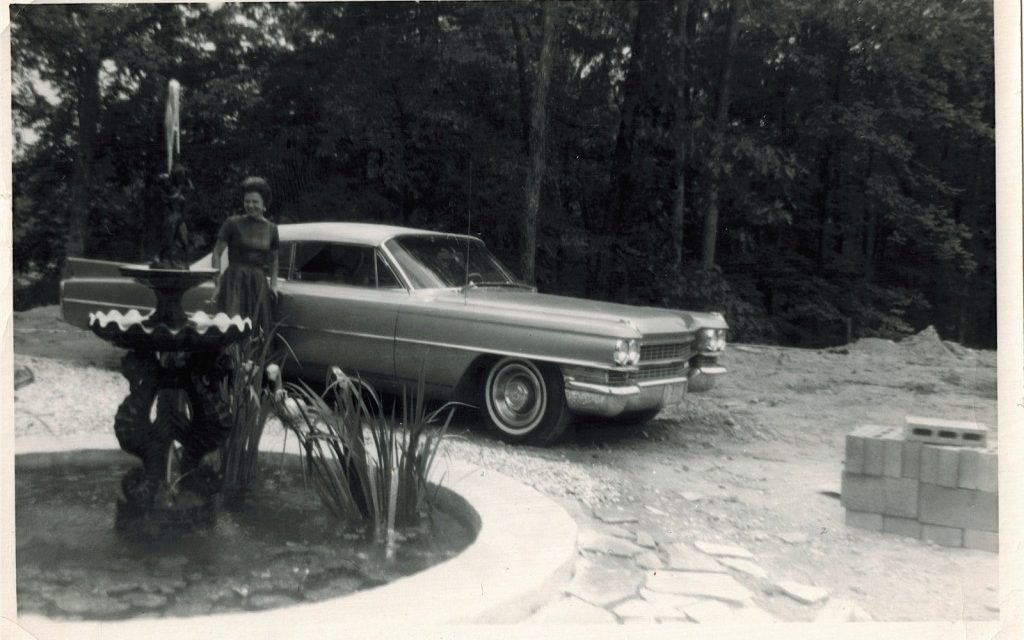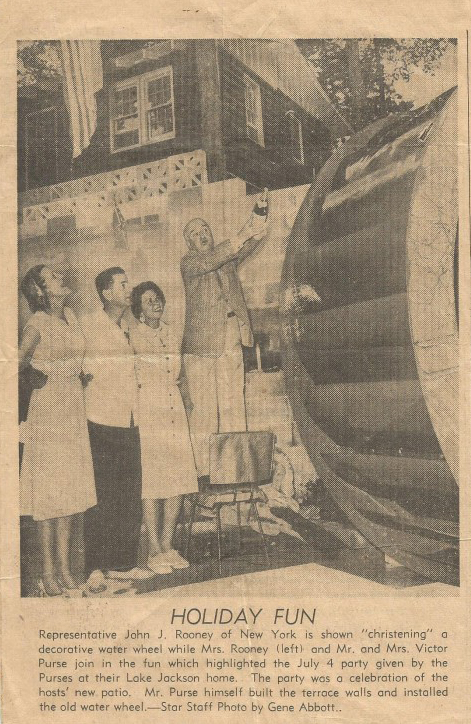The following story relates to a water front luxury home overlooking Lake Jackson outside of Manassas in Prince William County. Alvictus was built by State Department official Victor Purse. It’s past includes becoming a Cold War safe house of the Central Intelligence Agency to hide Russian spies defecting to the United States, and it’s guest list includes Robert Francis “Bobby” Kennedy, the 64th United States Attorney General (1961-1964).
This article is a look at the history of 8351 Purse Drive Manassas, Virginia. It is now 11625 Purse Drive. It also discusses the backgrounds of past owners.
The following story is from the Thursday, May 30, 1963 edition of the Journal Messenger. The title of the article is Contemporary Home at Lake Grew from Tiny Log Cabin. The article delivers the following information about Alvictus after an interview with Victor and Alice Purse.
“Mr. and Mrs. Victor Purse, in their search for mountain or waterfront property with development possibilities and within easy access to metropolitan Washington, discovered a little log cabin on the edge of a ravine overlooking Lake Jackson.
In 1959, they acquired the property and then purchased adjacent lots, including a ravine where the hillside was eroding into the lake. The hillside has been terraced with a swimming pool, and the little cabin is now a deep-red wing of a spacious two-story house of modern design complementing the natural beauty of the setting.
This house is constructed of colorful Bull Run Mountain stone, under a low-pitched roof of white gravel. In the first story, large white double doors form the front entrance into a center foyer which leads into the kitchen and dining area.
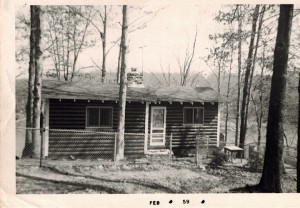
The Happy House was acquired in 1959 by Victor and Alice Purse. It would later become Alvictus and thought of as a government safe house by local residents. This modest summer cabin would later become a CIA safe house for defecting spies of the Soviet Union.
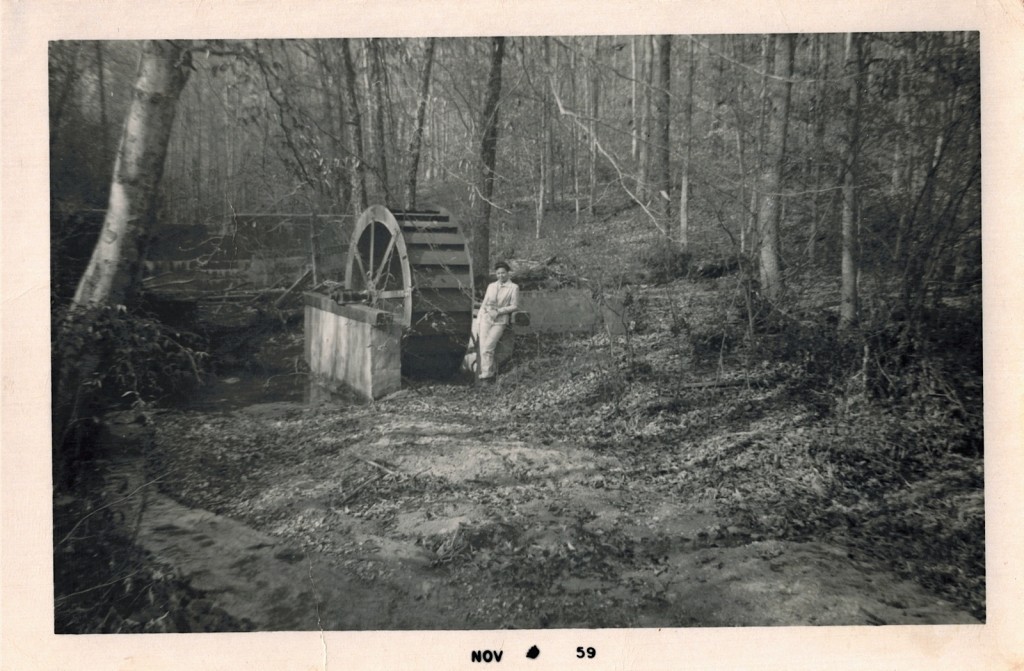
Victor Purse poses with the remains of Piney Branch Mill (November 1959) near Lake Jackson in Manassas. The water wheel was removed from the mill site between McGrath Road and Lake Jackson on Piney Branch in Lake Jackson.
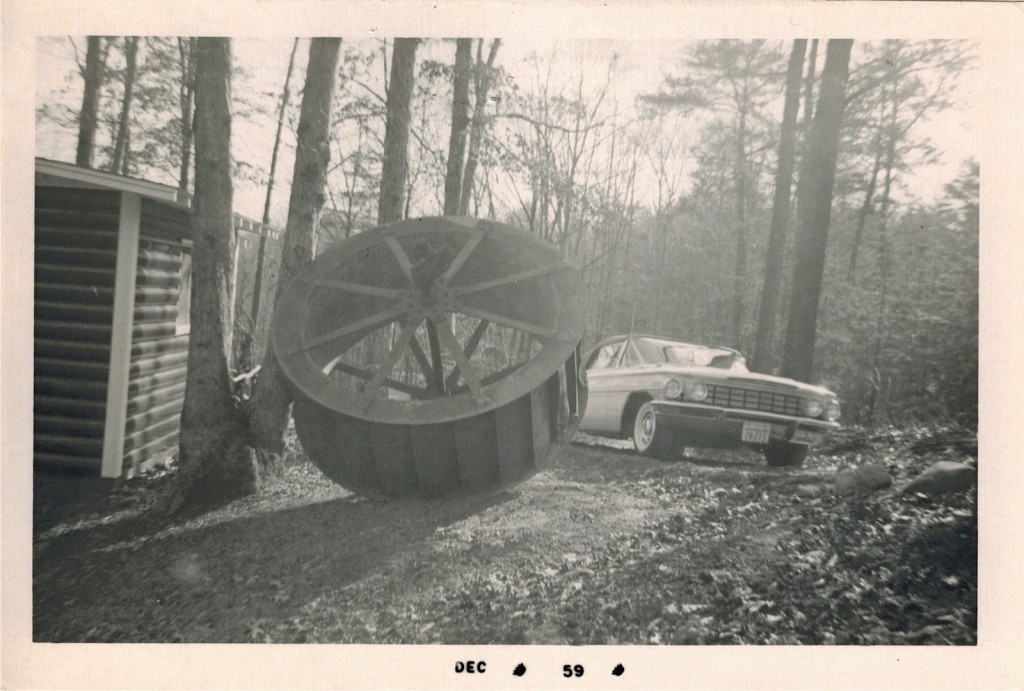
The Piney Branch Mill water wheel delivered to the Happy House during the beginning phase of creating a luxury home overlooking Lake Jackson.
On the left is a large living room with front and end walls of glass 18-feet high, supported by white concrete pilasters. On the right is a breezeway, across from which is a large family, or sitting room. Steps down lead to a patio and a barbecue shelter facing the lake. On the back is an outside terrace-level entrance to the upper story where the sleeping quarters are arranged.
The Purses depend upon their own talent to build, landscape, and design the home and grounds, to blend into the contour of the land and lake. Their long-range plan for landscaping, furnishing the house, and refurbishing the little cabin reflects their deep love of the outdoors, and they hope to keep informality in all phases. Eventually, the entire hillside will be covered with informal terraces, pools, and plantings.
Mr. Purse is Executive Director for Administration in the State Department, in Washington, and Mrs. Purse is principal technical assistant to the Director of Purchases in the Government Printing Office. They look forward to retirement when they will have more time to enjoy the peace and beauty of Virginia.”
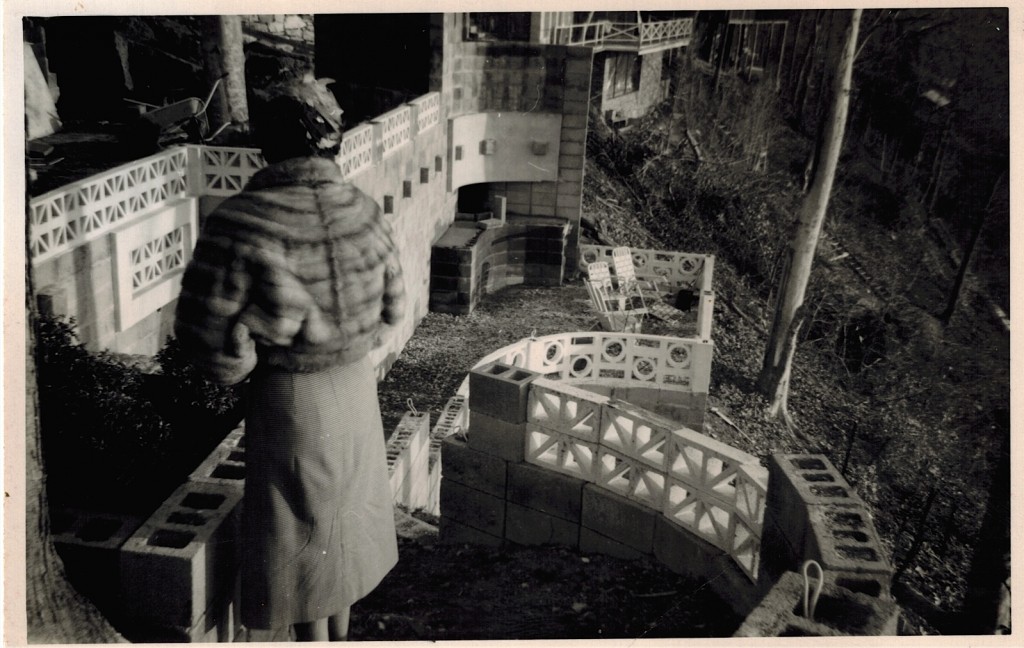
Mrs. Alice Jackelen Moore Purse overlooks the construction of lower terraces between Alvictus and Lake Jackson.
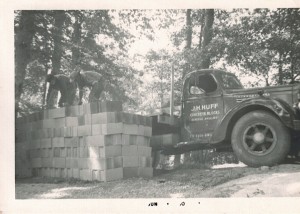
J. H. Huff Concrete Blocks delivers building materials for the expansion next to the Happy House of Victor & Alice Purse. Between the retaining walls and 1960 addition, Alvictus used more than 15,000 concrete reinforced masonry blocks to complete.
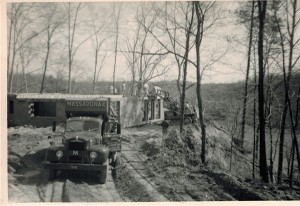
The Massaponax Sand & Gravel Company (Fredericksburg, Virginia) delivers crushed stone to stabilize the concrete floors of the lake front addition built by Victor Purse.
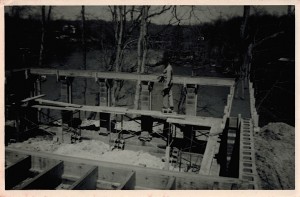
The great room of Alvictus becomes recognizable as the cinder block walls and window frames are completed.
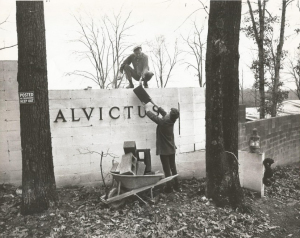
This is Victor and Alice Purse (c. 1964) building the security wall of Alvictus. This is the construction of the main entrance at 11625 Purse Drive. According to Victor Purse more than 15,000 reinforced masonry blocks were used to build the terraces and 1960 house addition.
The extensive costs associated with expanding the Lake Jackson Shores property may have been possible by an insurance settlement from a vehicle accident involving Alice Jackelen Moore Purse (b. April 17, 1910 d. November 7, 1999). On June 1, 2014, I met several granddaughters of Alice Purse while they toured Alvictus enjoying the past memories of visiting their grandmother’s home and learning to swim after Victor Purse tossed them into the deep waters of the swimming pool. According to granddaughter Laura Rousseau, before her grandmother met Victor, she was involved in an accident which almost killed her when the vehicle she was riding in was struck by a passenger bus. The following lawsuit involved Greyhound Lines, Inc., and it was the largest settlement in the country at that time involving the victim of an automobile accident. The settlement became national headlines, and the sudden wealth of Alice Purse bought many suitors into her life including Victor Purse. He was recently divorced from Elsie Lewter Purse, and after a few months of meeting each other they were husband and wife. I learned Victor Purse entered service with the State Department in 1943 as a Management and Procedure Analyst. In 1948, he became the Special Assistant to the Assistant Secretary of State for Administration (salary $7,341), and then Deputy Chief of Protocol between 1954 through 1957, serving as the Acting Chief of Protocol in 1955. He made national headlines in 1957 while serving as the Deputy Chief of Protocol.
Laura Rousseau of Laurel, Maryland, and her sisters Patricia Marion and Michelle Camba are all granddaughters of Alice Purse. They described her as a woman dedicated to the Catholic Church, attending daily services even before commuting from Lake Jackson to the Government Printing Office in Washington, D. C. where she began working as a typesetting machine operator. She later became the Director of Purchasing & Procurement before retiring in 1976 and moving back to her home town in Glenwood City, St. Croix County, Wisconsin. They remembered Alice Purse telling them she arrived in Washington, D. C. looking for work. When she applied for an entry-level job at the Government Printing Office she didn’t have enough money to pay the bus fare from her apartment to the job interview. So she walked several miles across Washington, D. C. out of money and desperate for a job. This best describes Alice Purse according to her grandchildren. She was a very hard worker which led to a successful career and retirement from the Government Printing Office. While at home she was committed to developing Alvictus into a home with landscaping and gardens worthy of national attention. At one time there were thousands of Azalea bushes planted at Alvictus from the edge of the lake to the top terrace which helped earn the recognition it received through several newspaper articles.
The above caption reads: Representative John J. Rooney of New York is shown “christening” a decorative water wheel while Mrs. Catherine Rooney (left) and Mr. and Mrs. Purse join in the fun which highlighted the July 4 party given by the Purse’s at their Lake Jackson home. The party was a celebration of the hosts’ new patio. Mr. Purse himself built the terrace walls and installed the old water wheel. – Star Staff Photo by Gene Abbott. John James Rooney (D) served the United States House of Representatives from 1943-1974 serving the 14th Congressional District (Brooklyn). He was instrumental to State Department operations as he served as the Chairman of the House Appropriations Subcommittee for the Departments of State, Justice and Judiciary. He was also close friends with FBI Director J. Edgar Hoover. Victor Purse built Alvictus for entertaining foreign dignitaries and government officials with influence. His lake front home became well known for its parties and networking opportunities during weekend getaways. This photograph is from the Evening Star (Sunday July 5,1959).
Victor Purse has received a lot of attention for his association with Alvictus. But it was Alice Purse who occupied Alvictus while it served as a safe house for foreign spies. According to Laura Rousseau, Alice and Victor divorced after the article in The Evening Star was published. It’s probably why the construction to complete the full-scale plan for Alvictus never occurred. Alice Purse became the sole owner of Alvictus on March 28, 1967. The granddaughters of Alice Purse stated it was Victor who arranged for the Central Intelligence Agency to use the Happy House when intelligence officials needed a nearby hiding place. While Alice Purse continued living in the 1960 addition, family visits were sometimes met with men armed with rifles and machine guns walking the grounds and rooftop of Alvictus between 1965-1968. Betty Moore was the wife of William Moore, son of Alice Jackelen Moore Purse (daughter-in-law). She remembered there were times when Alice Purse restricted access to the Happy House and visits to Alvictus by family members. Alice Purse, described as quiet and tight-lipped, would later admit to her family that visits had to be restricted because Alvictus was an active safe house with spies living in the Happy House. Even though Victor and Alice were divorced, he continued to visit Alvictus. On February 12, 1976, Alice sold Alvictus to Victor. The family of Alice Purse remain uncertain why Victor purchased Alvictus because at the time he was living in Palm Beach, Florida in a house twice the size with more luxury features than Alvictus. After she retired from the Government Printing Office she left Alvictus never to return. Victor Purse spent a lot of time at Alvictus after Alice moved to back to Wisconsin. He began working classified assignments as a civilian of government affairs when he retired from duties at the State Department. It isn’t clear when Alvictus was last used as a safe house.
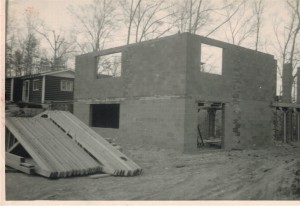
The addition of a second kitchen (first floor), musical organ room (second floor), and great room are part of the transformation from a lake side cabin into a luxury home overlooking Lake Jackson in Manassas. The formal dining room next to the kitchen was a 1970 addition.

Carpenters framing the roof line of the great room. The views of this luxury home are illustrated in this photograph with Lake Jackson in the background.
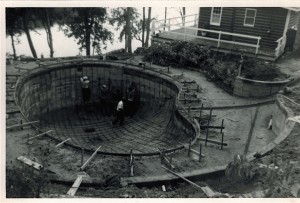
The construction of the swimming pool at Alvictus (circa 1959) on the bluffs overlooking Lake Jackson near Manassas.
In the Society-Home section of the Wednesday, March 25, 1964 edition of The Evening Star, Mary L. Vaughan, the Star Homefurnishings Editor wrote a story about Alvictus titled, His Home Is Really His Own. The article reads, “There’s a heliport staked out in Victor Purse’s new backyard. It may be that the landing pad never will become a reality, but the State Department official is perfectly serious about its need after commuting daily for five years by auto from his Lake Jackson (Va.) home. He’s holding an application from the Federal Aviation Authority when the heliport is finished to regulation specifications. Of the heliport, Mr. Purse predicts, “Auto traffic will eventually make Shirley Highway (Interstate 95) practically impassable. When that time comes, every county will need its own heliport to get commuters to work in Washington.”
The article stated, “It’s been six years since Mr. Purse, one of official Washington’s most colorful personalities, dropped out of the public spotlight. Until 1957, Victor was the man seen most often in news photos and on TV screens welcoming foreign dignitaries for the Department of State. Youthful looking and vigorous, he was regarded by the press corps as a man who cut promptly through the red tape to get things done. Then, his job as Acting Deputy Chief of Protocol blew up when his judgement was questioned for accepting from King Saud, a gift automobile.
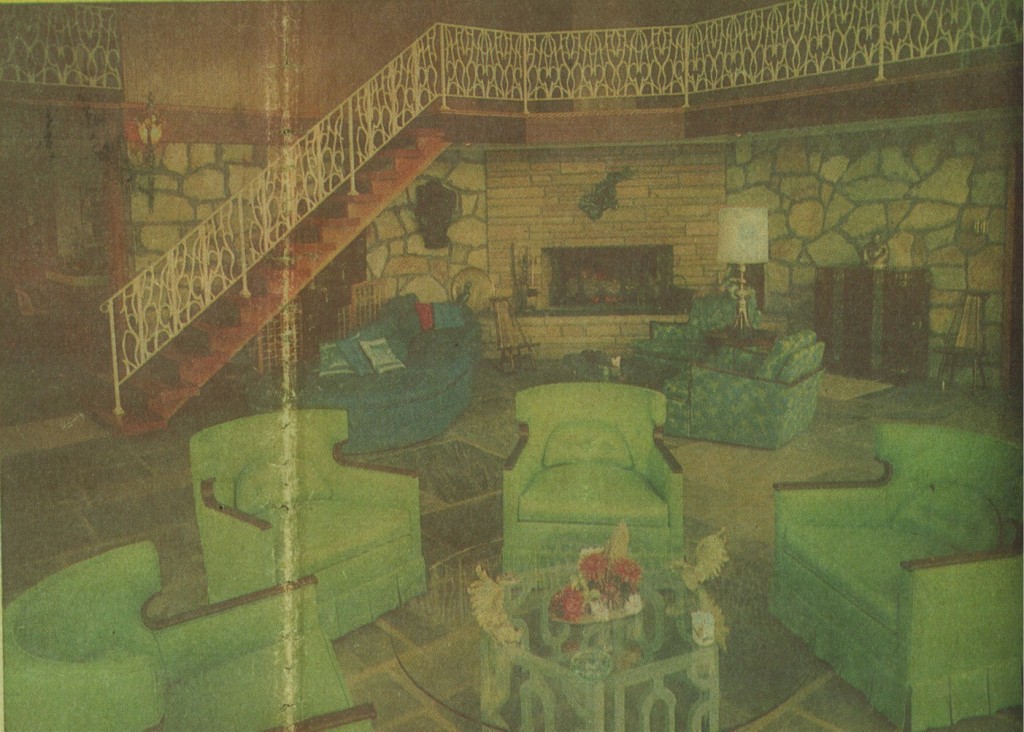
This was the photograph in the Society-Home section that accompanied the newspaper article His Home Is Really His Own in the Wednesday March 25, 1964 edition of The Evening Star. The caption stated, “An 18 foot ceiling and window walls overlooking the lake are architectural features of the new living room in Mr. Victor Purse’s home. Doors from the balcony open into bedrooms and a den (upper left) that is open to the room below at one end. Bulldozers scooped out earth beside a tiny cabin to make way for the 30 by 42 foot room that connects on the upper level with the original cabin, now a little wing. Mr. Purse, Executive Director for Administration of the State Department, did most of the work at his home, reclaiming the land around it. In this living room view, the dinette and kitchen open up at the far left. – Star Staff Color Photo by Gene Abbott. When Victor Purse designed this room he left the wall separating this room from the upstairs den (upper left) partially open. This design allowed him to position a musical organ next to the opening and play it for guests during parties.
Focusing on Alvictus, the newspaper article reported that Victor and Alice reconstructed the lakeside cabin with no basement, lawn, or lake front terrace. Only a dangerous and steep path down a 40 foot gully to the shore line. Inside the 20′ by 30′ chalet was a living room with stone fireplace, small kitchen, and tiny (10′ by 10′) bedroom. To enlarge the cabin, Victor dug deep into the steep slope to place a living room, 30′ by 42′ and 18′ in height. Outdoors, they built a cinderblock retaining wall and terrace that served as a picnic and sunbathing spot the first year Victor and Alice lived at the Happy House. Working up the side of the hill, one terrace each year, they came out on top four years later with a wall constructed behind the house and pool. Another level, encircling a huge tree, is designed as a captain’s bridge with a ship’s wheel, compass, bell, and marine lights. When asked what was left to be done, Victor Purse stated, “Just the dining room off the breakfast bar (the foundation was laid when this article was published), a Japanese tea house guest cottage, completing the waterfront and docks, and finishing the heliport.”
On October 23, 1957, Victor Purse was in New York assisting Queen Elizabeth II and Prince Philip while departing the United States after an official visit. Victor Purse had a tense relationship with political appointee Wiley T. Buchanan, Jr. who was the State Department Protocol Chief. Earlier in the year, Victor Purse had become personal friends with King Saud of Saudi Arabia during his visit to the United States and meeting with President Eisenhower. They became friends during the visit of the royal family, and King Saud insisted Victor Purse go with him back to Saudi Arabia and become his guest. These type of informal relationships with guests of President Eisenhower would eventually cause Mr. Buchanan to urge Loy W. Henderson, Deputy Undersecretary of State to remove Victor Purse from a protocol assignment.
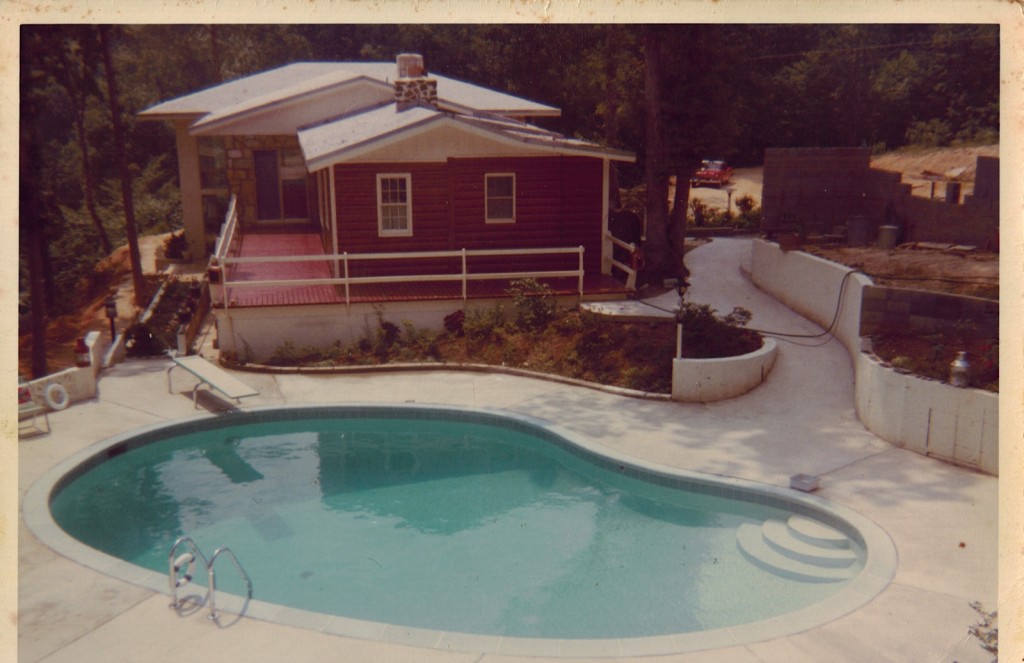
Newly constructed Alvictus (circa 1960). Suitable for entertaining foreign dignitaries.
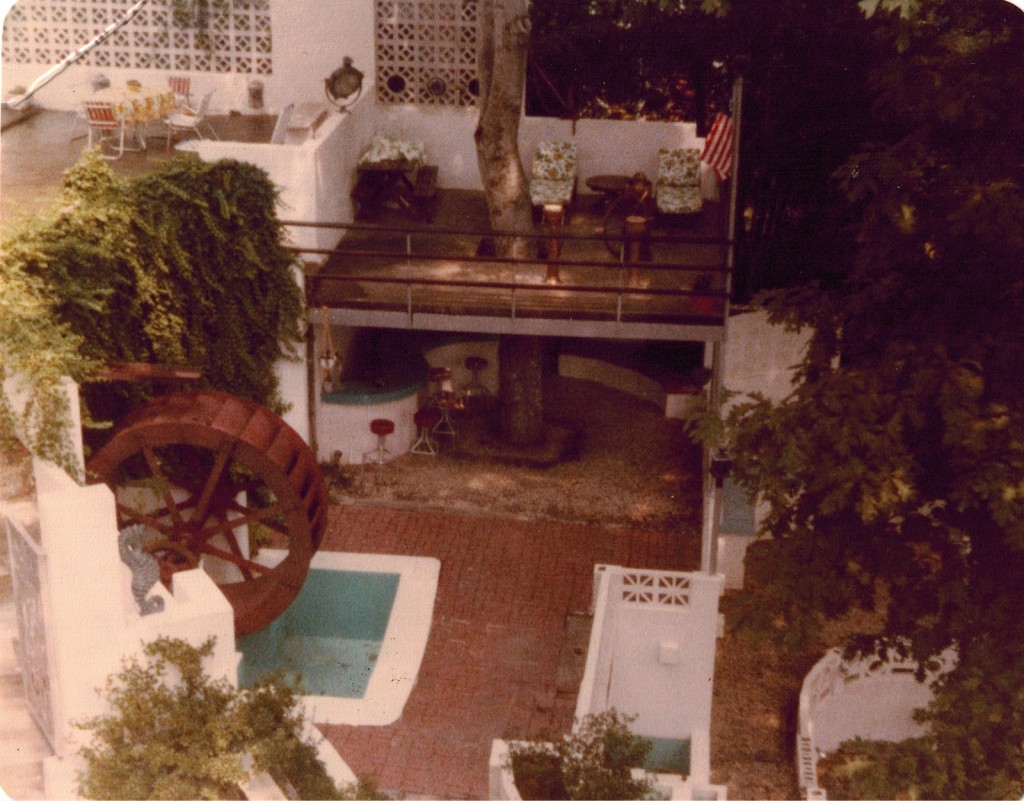
The Alvictus recreation amenities include the Piney Branch Mill water wheel, outdoor bar, upper and lower level observation decks overlooking Lake Jackson and the dam (high side). There is a captain’s wheel, compass, and bell above the outdoor bar. Victor Purse obtained these nautical items from the bridge of a former WWII ship.
Like many foreign diplomats visiting the United States, Queen Elizabeth II and Prince Philip became friendly with Victor Purse after meeting him. Victor Purse had assisted the royal couple through the formalities of an official visit in the United States. They were grateful to Victor Purse for his work during their visit, and extended an invitation to visit them at Buckingham Palace in Westminster, England.
This caused deeper tension between Purse and Buchanan which exploded after the royal couple left the United States and Victor Purse was invited to fly from New York to Washington, D. C. on the Columbine III, the presidential airplane. While Victor Purse was in the company of the President of the United States, Wiley T. Buchanan, Jr. had to use commercial transportation back to Washington, D. C.
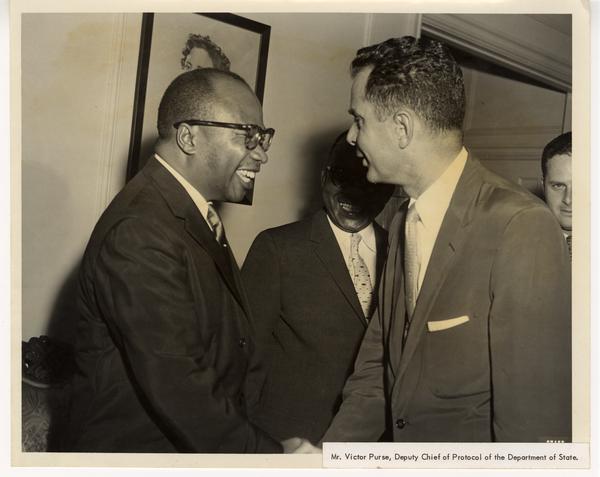
Victor Purse, Deputy Chief of Protocol with the Vice President of Liberia, William Richard Tolbert, Jr.
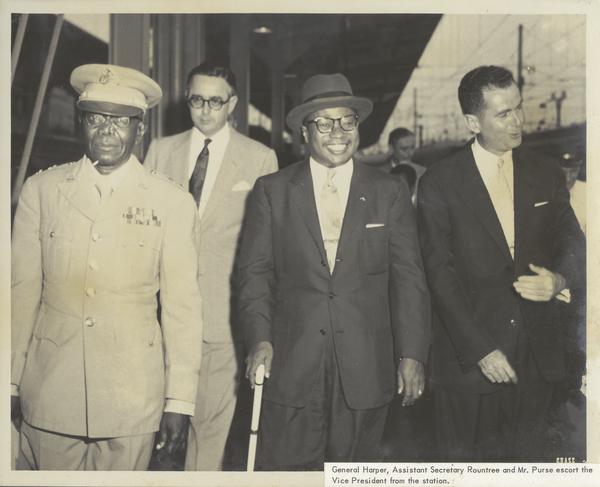
Liberia Vice President William R. Tolbert escorted by the Chief of Staff of Liberian Armed Forces, General A.R. Harper, U.S. Assistant Secretary of State William Rountree, U.S. Deputy Chief of Protocol, Mr. Victor Purse in Washington, D.C.
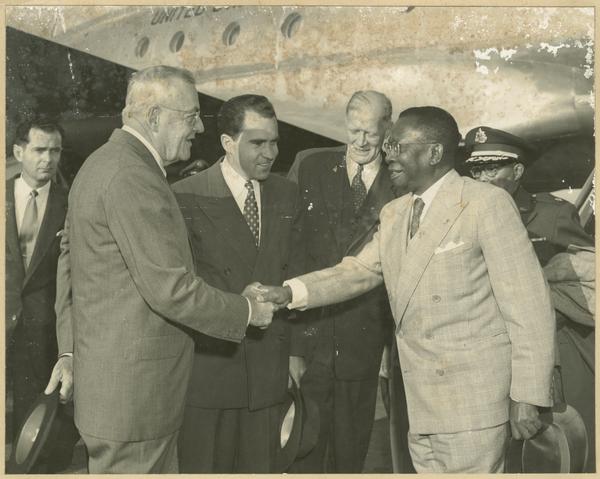
From left to right: Victor Purse, U.S. Deputy Chief of Protocol; John Foster Dulles, Secretary of State of the United States; John Farr Simmons, U.S. Chief of Protocol; William V. S. Tubman, President of Liberia; Brigadier General Robert Alexander Brewer, U.S. Aide de Camp; Richard Nixon, Vice President of the United States. Photo taken: 1954.
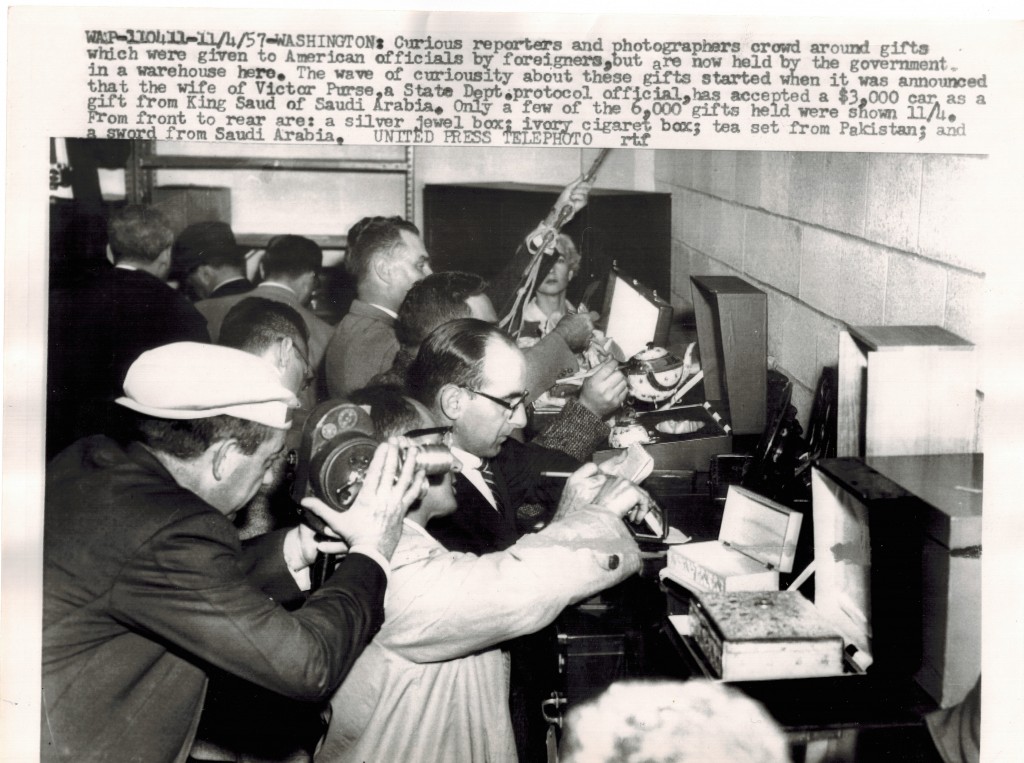
This United Press Associations photograph is dated November 4, 1957 (Washington). The attached caption reads: Curious reporters and photographers crowd around gifts which were given to American officials by foreigners, but are now held by the government in a warehouse here. The wave of curiosity about these gifts started when it was announced that the wife of Victor Purse, a State Dept. protocol official, has accepted a $3,000 car as a gift from King Saud of Saudi Arabia. Only a few of the 6,000 gifts held were shown 11/4. From front to rear are: a silver jewel box; ivory cigarette box; tea set from Pakistan; and a sword from Saudi Arabia. UNITED PRESS TELEPHOTO
When Buchanan saw Purse exit the presidential airplane, there was an immediate confrontation between the two protocol officials. The incident was reported by several press members who saw Buchanan confront Purse about riding with the President without authorization. It didn’t seem to matter that Victor Purse was invited by several cabinet officials to go with President Eisenhower during the flight. On March 24, 1957, the United Press International (UPI) reported this confrontation in an article titled, Victor Purse Booted Out of Job as State Department Chief of Protocol. The story was covered by news outlets throughout the nation, and most parts of the world. Reports from sources inside the State Department described a long time behind-the-scenes cold war between Buchanan and Purse. Buchanan (43) viewed Purse (39) as too undignified, fidgety, and casual for the task of guiding dignitaries through formal receptions, dinners, and visits.
Victor Purse viewed Buchanan as too stuffy and rigid in his approach to dealing with diplomats. When Victor Purse was asked by reporters to make a statement about this incident, he would only say, “I’ve been asked to leave protocol and take some new assignment.” When Wiley T. Buchanan Jr. was interviewed by newspaper reporters, he was asked if Victor Purse was removed from protocol because of the plane ride with President Eisenhower. Buchanan replied by saying, “The action of removing him from protocol has been under consideration for a long time.” It probably began when Mrs. Elsie Lewter Purse, the first wife of Victor Purse, was seen driving the Oldsmobile convertible sedan given to her as a gift from the King of Saudi Arabia.
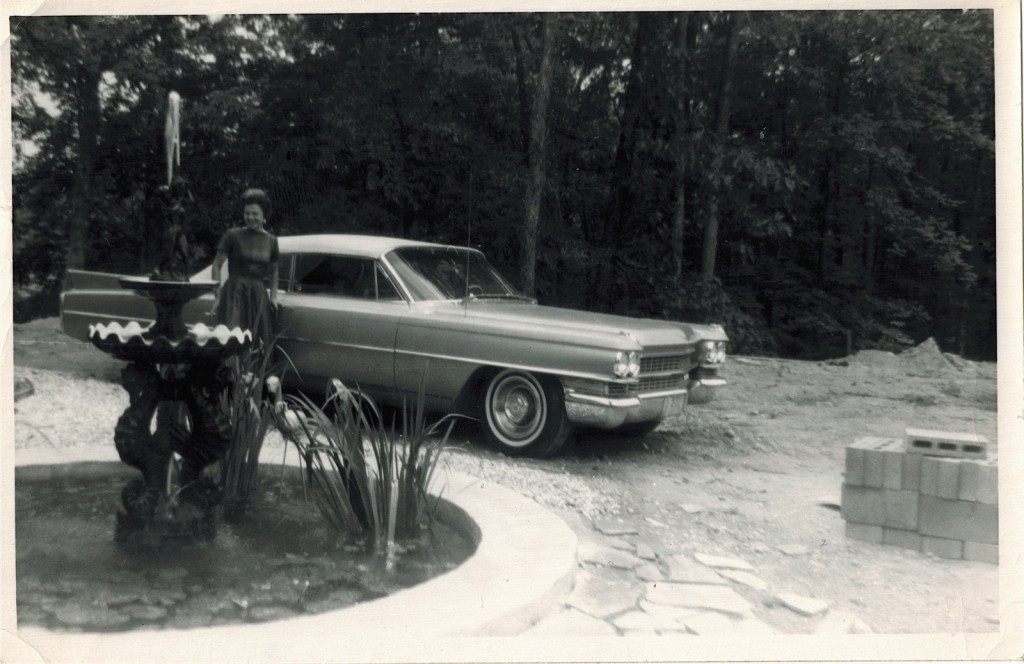
Mrs. Alice Jackelen Moore Purse (1960) at Alvictus in Lake Jackson.
While speaking to Jerry Lampe and John Rutledge, the current owners of Alvictus, I learned there were photographs documenting the transformation of this mystery house believed to be a Central Intelligence Agency safe house by Lake Jackson residents as mentioned in the article titled Secrets of Alvictus Capture Imagination of Jackson Residents in the August 3, 1993 edition of the Journal Messenger. The construction photographs, some featured in this article, have passed through Katherine Peters who purchased it from Victor Purse, and then through international antiques dealer, Larry Lomax, who purchased the home from Katherine Peters. He purchased Alvictus because he viewed it as the perfect venue for a gallery to showcase antiques and entertain clients while using it for a weekend getaway. He was a highly regarded antiques dealer between Europe and the United States. His main residence was in Washington, D. C. next to the French Embassy. This was no coincidence as the client list of Larry Lomax mostly included diplomats, senators, and movie stars. These photographs of Lake Jackson Dam during Hurricane Agnes, and the Bland’s Ford Bridge (one lane) were also discovered in the Alvictus construction pictures.
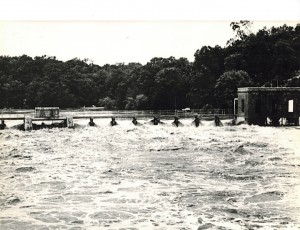
Lake Jackson Dam on June 22, 1972 during Hurricane Agnes.
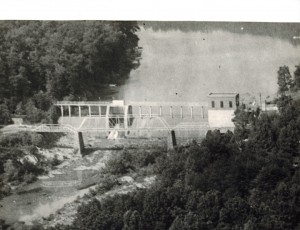
Lake Jackson Dam and Bland’s Ford Bridge (Dumfries Road).
ABOVE PHOTO: In 1927, Charles W. Alpaugh (b. 1876 d. 1957) and Christine Alpaugh and their 7 children came to Bland’s Ford to build a dam and hydro-electric power plant. On July 20, 1827, he purchased an acre of land for $100 each on opposite sides of the Occoquan River next to Bland’s Ford Bridge (pictured here) and Manassas-Independent Hill Road, later known as Dumfries Road (Route 234). After the first plans and construction of the Lake Jackson dam was completed by local workers, Mr. Alpaugh sold the dam and all claims on April 17, 1928 to Virginia Public Service which later became Virginia Electric and Power Company (VEPCO). His goal was to turn depressed farms, grist mills, sawmills, and moonshine operations into a summer escape for Washington, D. C. residents. The dam produced electricity for the surrounding area until 1955 when it became a booster station providing power when needed. Lake Jackson Hills, LLC eventually acquired 800 acres and by 1940 had built 80 log cabins from local resources. Construction at Lake Jackson stopped as the Alpaugh sons served in the armed forces overseas during WWII. After WWII the new log cabins were of vertical log construction, and permanent residents began residing at Lake Jackson after 1950. Today, there are 3,000 Lake Jackson residents, and about 95% of Lake Jackson Citizens Association members live at this lake community year-round.
On March 22, 2014, I spoke to Eowana Jordan, a retired teacher living in Manassas. Her mother, Katherine Peters, purchased Alvictus from Victor Purse in 1983. Katherine Peters lived in the Happy House while Eowana Jordan lived in the 3 room addition. She stated Victor Purse didn’t want to sell Alvictus but he was living in Boynton Beach, Florida during winter months, and needed to sell his summer home to pay for debt obligations due to divorce from his fourth wife Claire Julia Lawson (m. September 30, 1978 d. July 13, 1983). Eowana Jordan commented Victor Purse did everything he could to keep Alvictus in his family instead of selling it. He loved Alvictus so much that after selling the luxury house he built, he asked her if she would let him to be buried on the grounds upon his death. Although Mr. Purse is deceased, he is not buried in Lake Jackson. After he sold Alvictus, Victor Purse occasionally returned to his lake side retreat while visiting friends in the region. The photograph (below) captures one of those visits.
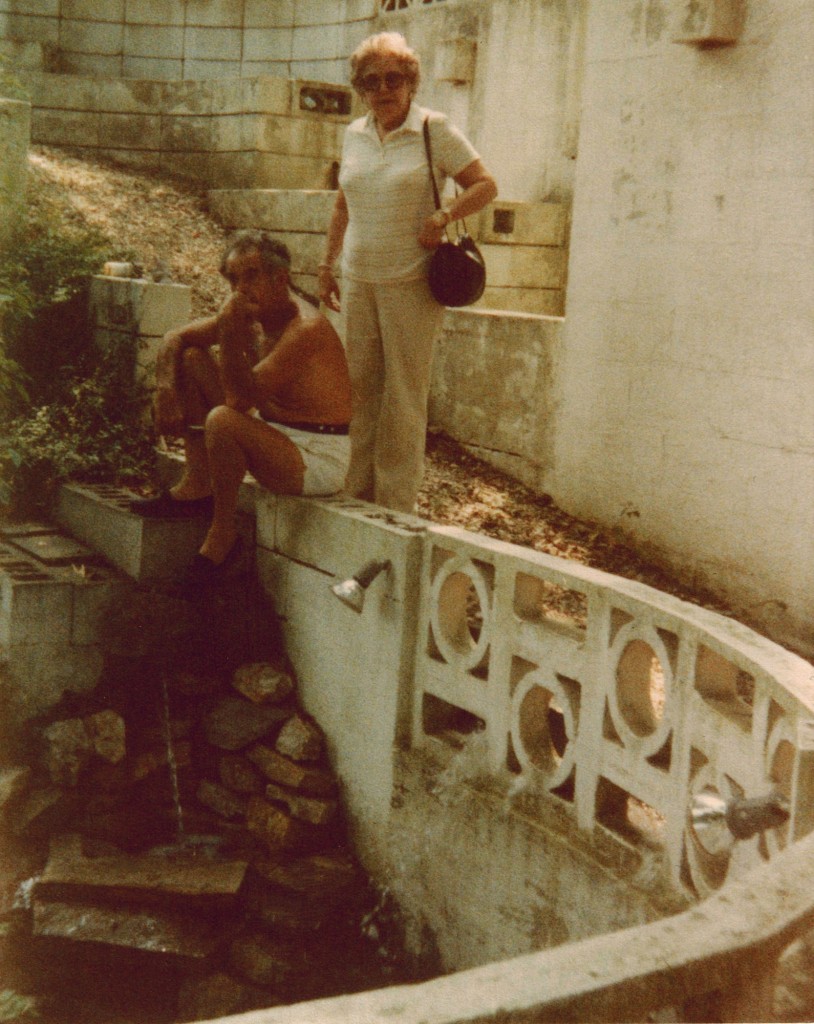
Victor Purse and Katherine Peters (1983) at the stairway leading to Lake Jackson. Victor Purse sold Alvictus to Katherine Peters after retiring from duties at the State Department.
Eowana Jordan found Alvictus through a newspaper advertisement for the sale of this lake front home with an in-law suite. She drove to Lake Jackson and met Victor Purse. As they toured Alvictus she walked into the two-story living room and immediately knew she wanted her mother to buy it. She appreciated everything about it including the 18 feet deep, concrete and block reinforced retaining wall running the length of the house, entertainment amenities, gardens, and swimming pool which is 13 feet deep because Victor Purse wanted it to rest on solid rock to avoid cracks and future repair problems. She mentioned the original construction plans did not include a water wheel on the bank of Lake Jackson. But Victor Purse was driving through Lake Jackson when he noticed the remains of the abandoned mill on Piney Branch next to McGrath Road. He located the owner and paid him a small amount to remove the 5 ton wheel with a heavy-duty tow truck, and slide it down the hillside to its current position.
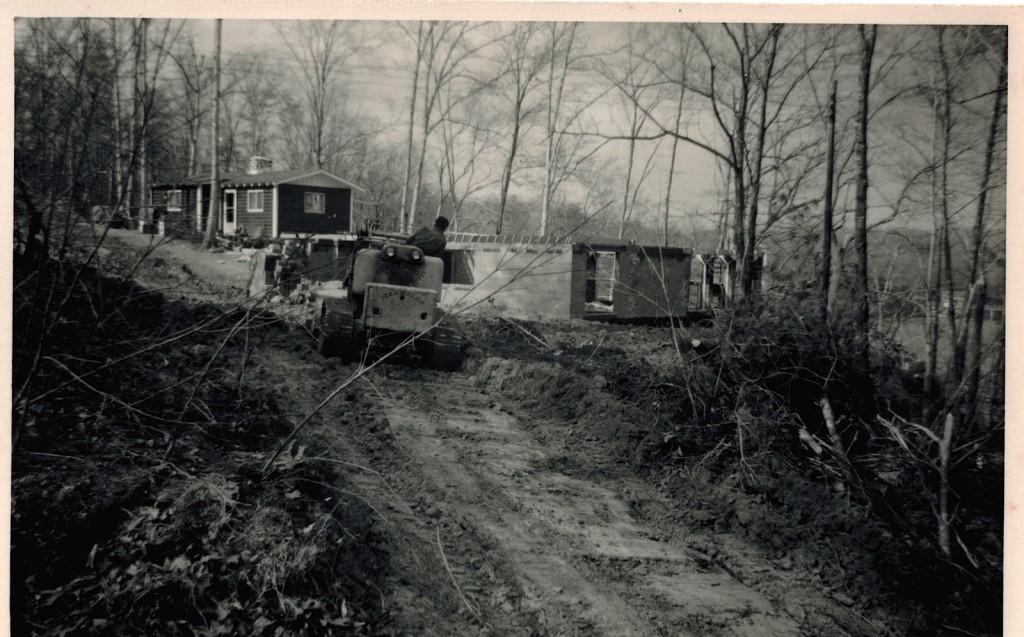
Mr. Victor Purse, the original owner of Alvictus, clears land which is now occupied by a 800 square foot detached garage, and second gate to Vic Place which allows different entry and exit points at Alvictus when several visitors are using the driveway .
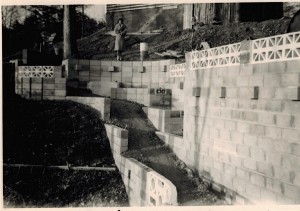
Mrs. Alice Purse overlooks construction of the retaining wall and lower observation deck.
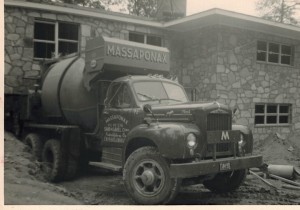
Massaponax Sand & Gravel pours the concrete floor of the car port which later became the reception room.
When researching the background of Alvictus, I was surprised to learn it wasn’t much of a secret that it was used as a safe house by the Central Intelligence Agency for defecting spies of the Soviet Union during the Cold War. It seemed to be common knowledge by residents of Lake Jackson. Victor Purse talked about Russian spies living in Alvictus during conversations with Eowana Jordan. Although there is no information how this arrangement was made, it began when Victor Purse lived in Arlington and Falls Church from 1958-1975, and then Palm Beach County, Florida after retiring from the State Department. Victor Purse felt his lake side home was ideal for use by the Central Intelligence Agency. We agree. The home is hidden on a street with few homes, and its surrounding walls and security gates make it suitable for housing anyone trying to live a quiet existence. Victor Purse also mentioned he knew the identity of one of the many spies staying at Alvictus. By agreement, Victor Purse was unaware of the much of what was happening at Alvictus when the United States Government was paying rent for its guests. When asked if any other interesting people have visited Alvictus Victor Purse stated, “Robert Kennedy was out here once. That’s all I can say about it.”
During discussions with Victor Purse related his work as the Deputy Chief of Protocol for the State Department, Eowana Jordan remembered he had a deep appreciation for Queen Elizabeth II and often talked about his relationship with her. During a second official visit of Queen Elizabeth II and Prince Philip to the United States, Victor Purse was living in Palm Beach County, Florida with his third wife, Claire Malcolm Lawson (married on March 18, 1972; divorced on October 3, 1973). The queen sent Victor Purse a letter wishing him happiness along with a set of china as a wedding gift. She also invited him to a State Department sponsored reception as a guest of the royal couple. When Victor Purse approached her majesty, she reached out for his hand and embraced him. This was very unusual because it is forbidden by tradition to touch the Queen of England. Victor Purse considered this moment, among others in the presence of the royal family, as a special moment, showing him the appreciation the queen had for their friendship. The china set remains with the family according to Laura Rousseau (granddaughter of Alice Purse).
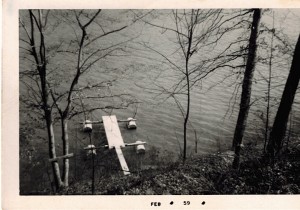
The Happy House was a simple lake front cabin with simple amenities. This 1959 photograph shows the boat dock before the summer retreat was transformed into a luxury home. Victor Purse used a rope tied to a tree to climb up and down the hillside during the early years. Water skiing on Lake Jackson became popular in the 1950′s. Manassas area residents like myself, spent summers water skiing, cliff diving, and flying over lake waters on rope swings at Lake Jackson. Having friends living in the Lake Jackson community had benefits. Boat cruises and fishing from shore lines were always great times after sunset. It was easy to see the vision of Charles W. Alpaugh after gathering with friends at Lake Jackson.
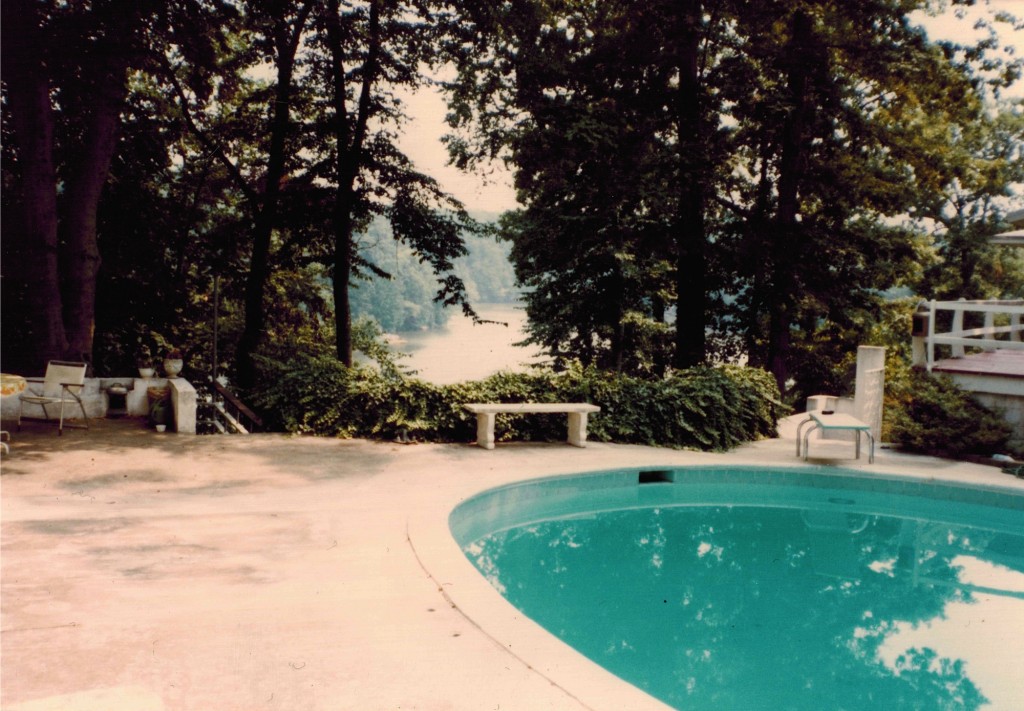
The swimming pool overlooking Lake Jackson
Victor Purse also discussed working with President Dwight D. Eisenhower. Several stories of his relationship with the President of the United States (George C. Marshall, Secretary of State) always ended with Victor Purse stating President Eisenhower was like a father to him. Purse commented he respected President Eisenhower more than anyone. I was surprised to learn Victor Purse never discussed a relationship with King Saud of Saudi Arabia after staying at the Royal Palace as the guest of the king for a month. But he did mention he didn’t like leaving his protocol duties, and complying with the directive of the State Department to return the luxury vehicle given to him by the King of Saudi Arabia. After his wife, Elsie Lewter Purse of Apex, N. C. (b. 1921 d. 2012) was directed to return the gifts of the king, she separated from her husband, divorcing soon afterward. She never returned the gifts which cost her husband his job in protocol according to Victor Purse. These sudden turn of events in the life of Victor Purse soon led to national headlines. Victor Purse was already bitter about the reprimand for his wife accepting the gift of a $3,000 car from the King of Saudi Arabia when he learned he would to transferred on October 30, 1957 to the Bureau of International Organization Affairs as the Executive Staff Director. He was already dealing with a separation from Elsie and their sons Victor Jr., 14, and Geoffrey, 12 when the State Department furthered his problems by publicly denounced him for using “bad judgement” in accepting the gift of the king. Like everything else in the life of Victor Purse, this made national headlines.
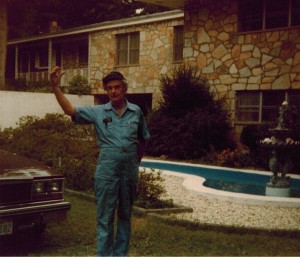
This is Victor R. Purse (b. March 18, 1918 Portland, Oregon d. June 1, 1994 Palm Beach, Florida) at Alvictus in 1983. He was a 1940 graduate of American University where he studied political science and economics. He was a cheerleader and a member of the track and tennis teams. He was a member of several clubs, participated in theater and chorus productions, and spoke several languages. In 1960 he received the State Department Superior Service Award. He was an interesting person with more newspaper headlines than we can discuss in this article. The story of Victor Purse is better than fiction. If he were still living this story might have become an intriguing book.
On November 19, 1957, the United Press released a report titled New Code Governs Gift-Taking by U. S. Diplomats. The article reported the State Department had circulated a new code of ethics governing U. S. Diplomats, and their wives, in accepting gifts from foreign governments. The new code stated no American diplomat shall accept any gift from a foreign government of such value that it might cast suspicion of bribery. There was even mention of avoiding conduct similar to Victor Purse. The treatment of Victor Purse wasn’t justified when considering the new gift rules were designed for officials in a positions of authority to influence foreign policy. This certainly didn’t apply to a protocol official. King Saud distributed 70 trunks of expensive gifts to government officials. But Victor Purse was the only diplomat punished for accepting a token of appreciation for his work. The Purse Rule ignored First Lady Mamie Eisenhower receiving a diamond necklace described as too heavy to wear. When President Eisenhower faced questions about its origin, many speculated he told the First Lady not to wear it to future state functions. Secretary of State John Foster Dulles, and Vice-President Richard Nixon both received gifts higher in value than the vehicle given to Mrs. Purse. It was President Eisenhower who wanted tighter controls of gifts from foreign governments. Even after receiving more than $300,000 in gifts while in the White House. Among those gifts were a modern kitchen for his Gettysburg farm house, farm machinery, putting green, farm tractor, antique furniture, and 25 purebred Black Angus cattle.
This led to the next headline by the United Press and news organizations throughout the country. On January 30, 1958, the lead story was titled, Diplomat Found Unconscious in Gas-Filled Apartment. Victor Purse didn’t report for work during normal morning hours, an investigation of his whereabouts led to him being found wrapped in a blanket on the kitchen floor of his apartment. Arlington Police detectives reported all gas jets of the stove were open and a cardboard box covered a ventilator. His mother, Dr. Grace Sheeks Guile Purse (b. 1886 d. 1961) told reporters her son had been upset for months about the car and the separation from his family. When reporters continued to press her for answers explaining the conduct of her son, the highly regarded physician stated, “He is highly emotional and very dramatic. That’s how he got to where he is, and that’s all there is to it.” Victor Purse would recover from this incident, and by 1962 he became the Executive Director for the Bureau of Administration at the State Department. In fact, in a book written by Bryton Barron titled, The Untouchable State Department, Victor Purse is described as the most respected, capable, and distinguished employee of the State Department.
Victor Purse appears to be more interesting than most people. Just like Alvictus is to other homes. When I asked Eowana Jordan why many additions to Alvictus were never completed she explained, “Like a lot of things, Victor had great ideas but often moved on to other projects before developing past plans. She described him as hyper, while refusing to talk to many neighbors. He liked attending and hosting parties, and built Alvictus (meaning Alice-Victor-us) for entertaining dignitaries and friends. He caught the attention of people by doing peculiar things like driving an amphibious car. When it came to his career he seemed different from most people. If he was responsible for something he became focused and was determined for it to succeed. But it had to be done his way. He did not care if someone disagreed with him, he was intimidated by nobody and he was going to do things his way.” The grandchildren of Alice Purse gave me the same description of Victor Purse noting there was nothing he couldn’t do if he set his mind to accomplishing specific goals.
The story of purchasing the Happy House is unusual like everything else about the history of this home. Charles W. Alpaugh the developer of Lake Jackson, had three sons. They were Luther, Walter, and Woodrow Alpaugh. All three of them worked for Lake Jackson Hills, LLC while living in the Lake Jackson community. The sales office for Charles W. Alpaugh building company was at 11415 Mercury Drive next to Dumfries Road across from Lake Jackson Drive. It later served as a general store, and is now a sales center for Outdoor Home Center. On September 13, 1958, Richard L. Lester, Sr. (age 70), was murdered in the upstairs apartment of the sales office where he was living as an employee of Charles Alpaugh. His son, Luther Alpaugh was charged with murdering Richard Lester after William D. “Billy” Gavin reported witnessing the murder.
While researching this incident, I found the Associated Press report on the trial of Luther Alpaugh. The October 4, 1959 article Tell me, do you consider your Realtor Freed Of Murder Count (MANASSAS) reported, “A Prince William County real estate executive was cleared of a murder charge Friday despite the testimony of a witness who claimed to have seen the shooting. Luther A. Alpaugh, 54, won directed verdict of acquittal at his trial here before Circuit Judge Harry L. Carrico. Alpaugh was charged with killing Richard L. Lester Sr., 70, sales manager of the real estate firm owned by the Alpaugh family. Lester was shot to death in September of last year in his apartment at the real estate development.” The Free Lance-Star in Fredericksburg, November 24, 1959 newspaper edition, reported the trial of Luther Alpaugh and continuing murder investigation after his arrest. The article stated, “William D. “Billy” Gavin, an employee of the Alpaugh family, was a witness during the murder trial of Luther Alpaugh, 54, testifying he heard the fatal shot in Lester’s apartment, saw a figure he said was Luther Alpaugh, and dispensed of a pistol he found on the scene. The trial ended abruptly last month when Gavin refused to give a sample of his handwriting to corroborate his tale that he had written an account of the shooting. The court directed a jury verdict clearing Alpaugh. Billy Gavin eventually confessed to the murder. I couldn’t find details related to a motive, but Billy Gavin was facing unrelated burglary charges in Manassas when he committed this murder.” Billy Gavin was a person of questionable character. He was a professional horse jockey before he came to Lake Jackson looking for work after he was caught fixing races.
Luther Alpaugh owned the Happy House and surrounding 2 acres. It is one of the best views of Lake Jackson. His plans for it included building a luxury house for himself.
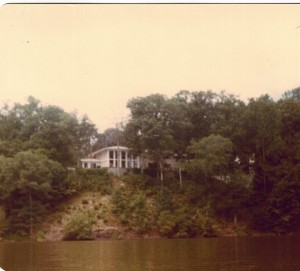
Alvictus overlooking Lake Jackson during summer months. The stairs leading to the dock are on the right. The house faces the dam and the Dumfries Road (Route 234) bridge.
During this time Victor Purse was searching for a lake front property in Northern Virginia. According to Eowana Jordan, Mr. Purse heard about the legal problems of a member of the Alpaugh family, and directed his search to Lake Jackson hoping the misfortunes of Luther Alpaugh would lead to available property. He was right. Although Luther Alpaugh didn’t want to sell the property, he needed money for legal fees associated with being charged with murder. Victor Purse searched for property under the name of Luther Alpaugh and discovered the Happy House met all of his needs. It was lake front and out of sight in a hard to find place. The cabin earned the name Happy House because Victor and Alice Purse were happy to buy it. After selling the most commanding view of Lake Jackson, Luther Alpaugh was found innocent of any wrongdoing.
Eowana Jordan and Katherine Peters moved into Alvictus and made several upgrades. They added an air-conditioning system, renovated the entire house, built a stairway into the hillside leading down to the boat dock, and added 125 azalea bushes. The biggest problem involving renovations was getting contractors to find Alvictus before the existence of global positioning systems for directions. After this work was completed, the Manassas Garden Club included Alvictus on a list of premiere homes during a home and garden tour where hundreds of people parked at the community restaurant, and used shuttle buses to visit the luxury home overlooking Lake Jackson.
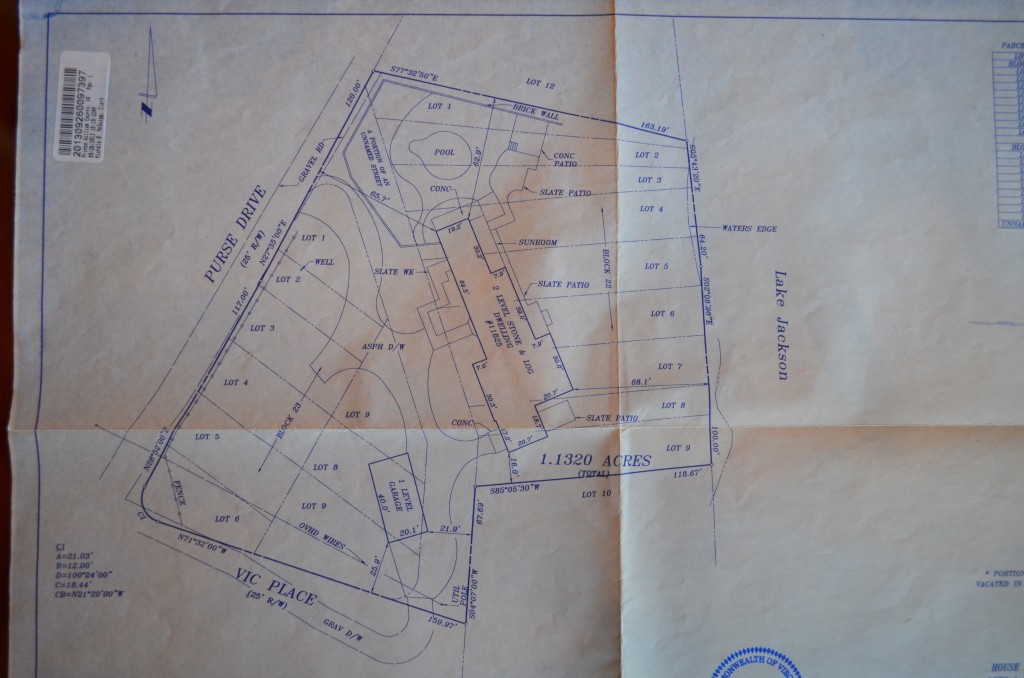
The land plat for Alvictus of Lake Jackson. The purchase by Victor Purse included 2 acres spread across many lots. After the FAA refused to issue a permit to build a heliport, that portion of the property was sold.
In 1993, Katherine Peters health was declining, and the mother and daughter residents began to look for a home closer to Manassas. Larry Lomax of Lawrence Lomax Antiques, Inc. and Lomax-Schinzel Antiques, Inc. in Chevy Chase, Maryland became the new owner of Alvictus by purchasing a residence for Katherine Peters in Manassas, and then trading homes. Once he took possession of the Lake Jackson home, he made several changes to the existing floor plan, and built a hallway connecting the in-law suite with the 1960 house. He also eliminated the car port between the dwellings by changing the space to a reception room. He then made several upgrades including the change of the Happy House from a log cabin into a stone structure, and replacing the lake side deck with a sun room. Inside the sun room are castle doors purchased while he was in England searching for antiques. He also added security gates and changed the name Happy House to the Lodge because it was originally a small vacation cabin. The property initially developed for a weekend retreat cabin had once again been transformed. It was now an antique gallery of European home furnishings.
Shortly after Larry Lomax completed renovations and additions to Alvictus he began experiencing health problems and he died at age 53. His weekend home and antique gallery was passed to his business partner Helmut G. F. Schinzel of Austria. He was buried at Congressional Cemetery in Washington, D. C. The obituary of Lawrence Lomax described him as an authority on 18th and 19th century European furniture and furnishings, and his antiques were regularly featured in decorator show houses organized to help the National Symphony Orchestra. He became a design judge for the American Society of Interior Decorators, and his firm was awarded an Architectural Digest Award. According to his obituary, his client list included the State Department, several first ladies (including Jacqueline Kennedy Onassis and Hillary Clinton), congressional leaders, foreign heads of state, and the supreme court.
The current owners were already living in Lake Jackson when Alvictus became available in 1993. Both John Rutledge and Jerry Lampe were at a party Lawrence Lomax was attending. During a conversation between Jerry Lampe and Larry Lomax, Mr. Lampe mentioned Alvictus was for sale and he was going to buy it. Larry Lomax used this information to contact Katherine Peters and end any chance of Lampe and Rutledge becoming the next owner(s). After becoming the owner of Alvictus, Larry Lomax stated he purchased it simply because he thought it was the best house in Lake Jackson, and he would find some use for it at a later time. The current owners remarked that Alvictus was occupied for no more than 30 days a year for antique showings and social gatherings while owned by Larry Lomax. After the death of Larry Lomax on November 23, 1999, Jerry Lampe and John Rutledge eagerly purchased it and have enjoyed living and entertaining in such a unique home in the Lake Jackson community. This lake front home of mystery will continue to serve its owners with views and entertainment amenities rarely matched in Northern Virginia.
On June 9, 2014, Jim Trengrove and Roberta Baskin agreed to terms to purchase Alvictus. They are both internationally recognized for the work in their respective fields of broadcast television covering affairs on Capitol Hill for PBS, and investigative reporting around the world. The tradition of intriguing people living at Alvictus continues. Among dozens of accolades for the current owners are 3 duPont-Colombia University Awards, 2 George Foster Peabody Awards which is the most prestigious award in broadcasting, the Edward R. Murrow Award, and many (17) Emmy Awards.
Below is a United States Information Service report titled King Saud visits President Eisenhower. It documents the 1957 official state visit of King Saud of Saudi Arabia. Victor Purse is shown throughout the video while serving the State Department as the Deputy Chief of Protocol. After arriving at the Blair House with President Eisenhower and King Saud, Victor Purse is recognized by the narrator by name at 10:40.
VIDEO: Voice of America, Chinese Service: Walk into America
Sean Enming Liu, a video journalist and television producer with Voice of America, Chinese Service produces a feature program called Walk into America that broadcasts to China, Hong Kong, Singapore and Taiwan in Mandarin Chinese. He created this video about spy houses in the United States during the Cold War. Alvictus is the feature of this production. Mostly due to the information in this article, and the Central Intelligence Agency unwilling to talk about this subject. The Voice of America is the United States Government international broadcasting agency broadcasting worldwide in 44 different languages. Interviewed here are Dwayne Moyers, Jim Trengrove and Roberta Baskin.
Dwayne Moyers researched, arranged, and published this article. He was born and raised in Manassas (1983 Osbourn Park Yellow Jacket), and is a real estate agent affiliated with Long and Foster Realtors. Dwayne and his wife, Associate Broker Maryanne Moyers, are a real estate team working with clients throughout Northern Virginia.

